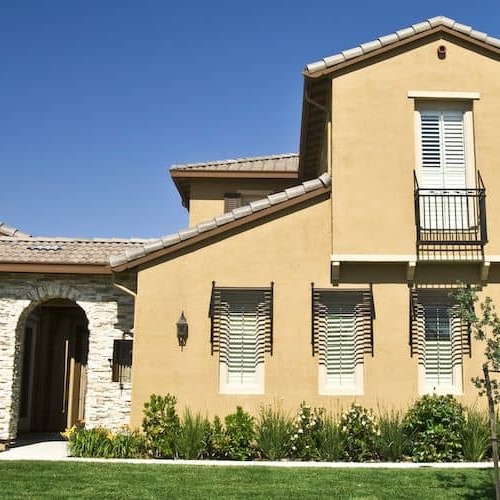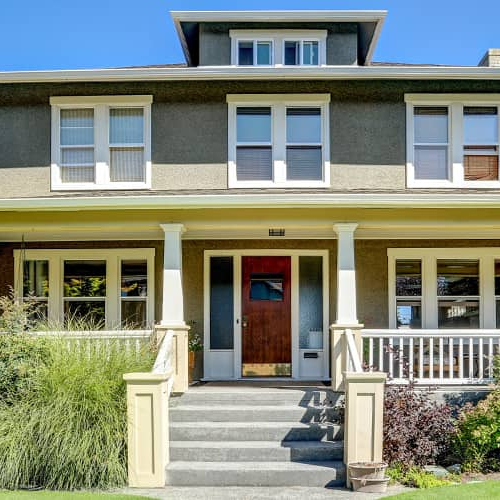15-year vs. 30-year mortgage comparison
Contributed by Karen Idelson
Jan 6, 2026
•6-minute read

When you apply for a mortgage, one of the things you need to decide on is the term of the loan. A loan’s term is how long it takes to pay the loan off by following the minimum payment schedule.
Mortgages are usually available with two different terms: 30 years and 15 years. 30-year mortgages are far more common, with more than 90% of mortgages in the US having a 30-year term. However, 15-year mortgages are not uncommon and could be a good fit for you if you can handle a higher monthly payment.
We’ll break down the key differences between 15- and 30-year mortgages and help you decide which is right for you.
15- vs. 30-year mortgage terms: What’s the difference?
The key difference between a 15-year mortgage and a 30-year mortgage is the loan’s term. However, that one difference does have other impacts, affecting the loans’ interest rates, monthly payments, and approval requirements.
Life of the loan
The most apparent distinction between a 15-year and 30-year loan is how long it takes to pay the loan back.
Imagine you applied for a mortgage and started making payments on January 1, 2025. With a 15-year loan, you’d be done paying it off in 2040. With a 30-year loan, you’d keep making payments until 2055.
Put another way, you pay off the loan twice as quickly if you apply for a 15-year loan. However, keep in mind that any refinancing1 to a new 30- or 15-year loan resets the clock on the mortgage’s life.
Interest rates
When you get a loan, your lender will set an interest rate for the loan, which impacts both the loan’s monthly payment and how much the loan costs overall. In general, lenders charge higher interest rates for loans that they perceive as riskier.
The shorter a loan’s term, the lower the risk of default from the borrower, so it means that 15-year mortgage rates are usually lower than 30-year mortgage rates.
You can see Rocket Mortgage’s® refinance rates here.
Approval requirements
15-year mortgages mean you pay your loan off in half the time when compared to a 30-year loan. Even with their lower interest rates, to be able to pay off the same amount in half the time means making larger payments each month.
That means that qualifying for a 15-year loan can be harder because you need to show the lender that you can handle the larger monthly payment. Some lenders also have higher credit score requirements for 15-year mortgages.
When deciding which type of loan to apply for, consider reaching out to a lender like Rocket Mortgage for help deciding whether you have a good chance of getting approved for a 15 or 30-year mortgage.
How much more does a 30-year mortgage cost?
30-year loans usually cost more than 15-year mortgages. On top of their higher interest rates, the longer loan term means that there is more time for interest to accrue on the loan. Consider this example.
You want to buy a $300,000 home. Because you’re prepared to make a 20% down payment of $60,000, you don’t have to factor in the cost of private mortgage insurance (PMI), and you get a mortgage for $240,000.
You can use the mortgage payment calculator from Rocket Mortgage to estimate your monthly payment based on your loan amount, loan term, interest rate and other factors.
Pros and cons of 15-year mortgages
15-year mortgages let you pay off your loan more quickly, but there are downsides you need to keep in mind before committing to one.
Pros
There are many reasons to consider getting a 15-year mortgage.
Own your home in 15 years
Getting a 15-year mortgage means paying your loan off twice as quickly as with a 30-year loan, so you’ll own your home free and clear in half the time.
Save thousands of dollars
The lower interest rates and shorter period of time for interest to accrue mean that 15-year loans cost far less in the long run than 30-year mortgages. You can expect to save tens of thousands or hundreds of thousands compared to a 30-year loan.
Build home equity faster
With a 15-year mortgage, you make larger payments toward your loan principal each month when compared to a 30-year mortgage. That helps you build equity in your home more quickly.
In just a few years, you could have enough equity to get a home equity loan or line of credit 2 that you can use for things like renovations.
Cons
15-year mortgages aren’t all upside. It’s also important to think about their drawbacks.
Higher mortgage payments
Possibly the greatest drawback of a 15-year loan is the higher monthly payment. For many people, a 15-year loan means settling for a less expensive home to keep the payment affordable. For some, a 15-year loan may simply be unaffordable.
Even if you have a strong income, the higher monthly payment represents an opportunity cost, reducing the amount of money you have for other purposes such as saving, discretionary spending, or other important purchases such as education or home improvements.
Fewer lender options
15-year mortgages aren’t necessarily uncommon, but they’re certainly not the norm when it comes to home loans. Not every lender offers 15-year loans, so you may have fewer options when you’re shopping around for a loan.
Pros and cons of 30-year mortgages
Though 30-year loans cost more in the long run, there are a lot of good reasons to consider applying for one. Consider the pros and cons.
Pros
There are a few good reasons to apply for a 30-year loan rather than a 15-year mortgage.
Lower monthly payments
30-year mortgages have lower monthly payments because you’re stretching your loan repayment over twice as much time. That can make them more affordable and offer you more flexibility in your monthly budget.
Potential to buy a bigger house
The lower monthly payments offered by 30-year mortgages could give you the opportunity to buy a bigger or more expensive home. Imagine you can afford a monthly principal and interest payment of $2,500.
Assuming both loans have the same rate, you could afford a more expensive home which may meet more of your needs with a 30-year loan than you may be able to purchase with a 15-year loan. You can use this mortgage calculator from Rocket Mortgage® to estimate the difference in payments for each mortgage term.
More mortgage options
The overwhelming majority of mortgages in the United States are 30-year loans, so just about every mortgage lender offers them.
That means that you’ll have plenty of lenders to work with when comparison shopping, giving you a better chance to explore the best rates and terms available.
Cons
30-year mortgages can be more affordable on a monthly basis, but it’s important to also consider their drawbacks.
Higher interest payments
30-year mortgages have higher interest rates and also last twice as long as 15-year loans, meaning there’s twice as much time for interest to accrue on your debt. Because of the length of the loan, your first few years of payments might mostly go toward interest rather than reducing principal.
You’ll usually wind up spending tens of thousands of dollars more over the life of a 30-year loan than a 15-year loan.
Slower equity build
Spreading your loan repayment over a longer period of time means that each monthly payment reduces the principal of your loan by a smaller amount. The result is that it can take a long time to start building a reasonable amount of equity.
If you want to use things like home equity loans or lines of credit to finance other purchases, you might have to wait longer before you have sufficient equity to qualify.
Options for paying off your 30-year mortgage early
Getting a 15-year mortgage is one option if you want to pay off your home loan more quickly. However, getting a 15-year loan commits you to those higher payments for the life of the loan. There are other options that can help you pay off a 30-year mortgage more quickly while retaining the flexibility they offer.
Some options for paying your loan off quickly include:
- Make extra payments: Making extra principal payments will bring down the balance faster.
- Make biweekly payments: This allows you to make half-payments every two weeks instead of one full payment every month. In a year, this usually amounts to one extra mortgage payment.
- Refinance: If you come into money or a higher salary, you may want to refinance your 30-year loan to a 15-year one.
- Recast your mortgage: If your lender allows mortgage recasting, you’ll make a lump sum payment on your principal, and then the lender will re-amortize your loan based on the new principal balance.
The bottom line: A 15-year mortgage costs more monthly, but you’ll pay less interest
While 30-year mortgages are far more common, 15-year loans are widely available for people looking to buy or refinance their home. 15-year loans have higher monthly payments, which can be tricky for some people to afford, but they can save you tens of thousands of dollars in interest over the life of the loan.
Think carefully about whether a 15-year loan is right for you, and consider ways to pay off a 30-year loan more quickly while retaining the flexibility of longer loans’ lower payments. If you’re ready, apply for a mortgage and see what you qualify for with Rocket Mortgage®.
1 Refinancing may increase finance charges over the life of the loan.
2 Home Equity Loan product requires full documentation of income and assets, credit score and max loan-to-value (LTV), combined loan-to-value (CLTV), and home equity combined loan-to-value (HCLTV) ratios. Requirements were updated 11/19/25 and are tiered as follows: 680 minimum FICO with a max LTV/CLTV/HCLTV of 80%, 700 minimum FICO with a max LTV/CLTV/HCLTV of 85%, and 740 minimum FICO with a max LTV/CLTV/HCLTV of 90%. Your debt-to-income ratio (DTI) must be 50% or below. Valid for loan amounts between $45,000.00 and $500,000.00 (minimum loan amount for properties located in Michigan is $10,000.00). Product is a second standalone lien and may not be used for piggyback transactions. Product not available on Ameriprise products. Guidelines may vary for self-employed individuals. Some mortgages may be considered “higher priced” based on the APOR spread test. Higher priced loans are not allowed on properties located in New York. Additional restrictions apply. This is not a commitment to lend.

TJ Porter
TJ Porter has ten years of experience as a personal finance writer covering investing, banking, credit, and more.
TJ's interest in personal finance began as he looked for ways to stretch his own dollars through deals or reward points. In all of his writing, TJ aims to provide easy to understand and actionable content that can help readers make financial choices that work for them.
When he's not writing about finance, TJ enjoys games (of the video and board variety), cooking and reading.
Related resources

8-minute read
How much you should spend on a house?
Wondering how much you should spend on a house as you begin the home buying process? Learn what your budget should be based on your income and expenses.
Read more

10-minute read
How much house can you afford?
Ever asked, “How much house can I afford?” Determine how much you can spend on a mortgage with help from the Rocket Mortgage home affordability calc...
Read more
9-minute read
How to get the best mortgage rate: 9 tips
Home buyers can get the lowest mortgage rate available, even when market rates are trending high. Uncover 9 tips for how to get the best mortgage rate.
Read more